Best Vitamins for Hair Fall: What Works and What Doesn’t
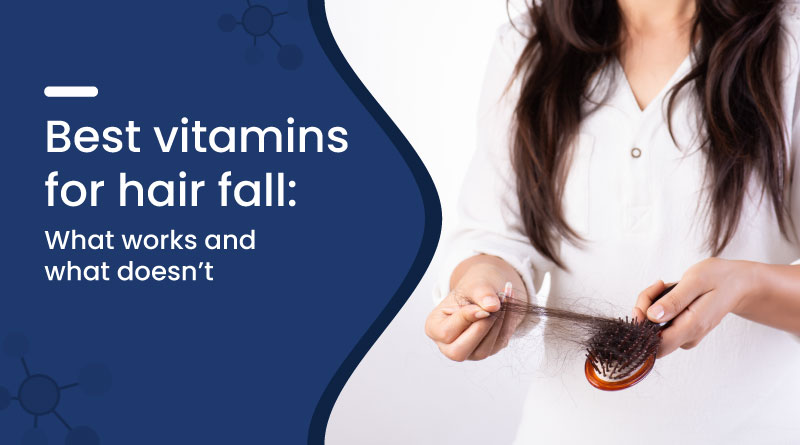

Hair fall is a frustrating problem for many people. From stress and pollution to poor diet and vitamin deficiencies, the causes can vary. But one common question people ask is: what are the best vitamins for hair fall? In this blog, we’ll explore the vitamins that help reduce hair loss and support healthy growth, and also clarify which ones don’t make much difference.
Which are the best vitamins for hair fall control?
If you are dealing with excessive hair shedding or thinning, certain vitamins can make a real difference. These include:
- Vitamin A – Supports sebum production to keep the scalp moisturized and hair healthy.
- B-Vitamins – Especially Biotin (B7) and Vitamin B12, which play a major role in strengthening hair and improving growth.
- Vitamin C – Protects against oxidative stress and helps in iron absorption, both of which are crucial for hair health.
- Vitamin D – Low levels are directly linked to hair loss, especially in women.
- Vitamin E – Boosts scalp circulation and promotes hair growth.
Together, these vitamins support the scalp, follicles, and overall hair structure — making them some of the best vitamins for hair fall control.
Vitamin Supplement for Hair Growth
| Product Name | Use for Hair Growth |
|---|---|
| E Vitazem 400 Vitamin E Softgel Capsule | Supports scalp health and strengthens hair with Vitamin E |
| E Vitazem Plus Capsule | Promotes hair health with antioxidant and multivitamin blend |
| E Vitazem LC Capsule | Helps keratin production and hair strength if it contains L-Cysteine |
| Multivitzee MVI Injection | Replenishes essential vitamins, may reduce hair loss from deficiencies |
| Vitazem 5G Softgel Capsule | Omega-3 and herbal extracts improve blood flow to hair follicles |
| My12 Forte Nerve Rejuvenator Capsule | Contains B12 and Biotin to aid hair regrowth and follicle health |
| My 12 D3 Tablet | Vitamin D3 and B12 support scalp health and prevent hair loss |
| Zinseng Forte | Stimulates hair follicles and reduces hair thinning with Ginseng |
| Zecobax Z Multivitamin Capsule | Includes Biotin and Zinc — essential for strong and healthy hair |
| Vitazem Multivitamin Capsule | Improves hair growth by correcting nutritional deficiencies |
| Vitazem Gold | Promotes thicker hair with a blend of Biotin, Zinc, and antioxidants |
| Primolene Women's Evening Primrose Oil Supplement | Helps regulate hormones that may affect women’s hair health |
| Feriext FA Iron Supplement Tablet | Corrects iron deficiency, a common cause of hair loss |
| Multiprex Syrup | Provides vitamins and minerals that support healthy hair growth |
| Multiprex Soft Gelatin Capsules | Multivitamin capsule to maintain hair and skin health |
How does Biotin help with hair fall?
Biotin, also known as Vitamin B7, is one of the most trusted nutrients for hair. It helps produce keratin, and low biotin levels can cause weak, brittle hair and hair loss. Taking adequate amounts of biotin can help improve strength, shine, and thickness.
Can a lack of Vitamin D lead to hair fall?
Yes, Vitamin D deficiency is often associated with increased hair shedding, particularly a condition called telogen effluvium. This vitamin helps stimulate hair follicles and supports the hair’s natural growth cycle. A healthy level of Vitamin D is essential for those struggling with chronic hair fall.
Is Vitamin E effective for reducing hair fall?
Vitamin E acts as a powerful antioxidant. It reduces scalp stress and boosts blood flow. This creates a healthier environment for hair follicles and can lead to reduced breakage and better hair density. However, like all nutrients, Vitamin E must be taken in the right dose — excessive intake can have the opposite effect.
Does Vitamin C help stop hair fall?
Yes, Vitamin C contributes to collagen production, which is vital for maintaining strong and flexible hair strands. It also helps your body absorb iron more efficiently — an essential mineral for hair growth. Iron deficiency, often caused by poor Vitamin C intake, is a known trigger for hair fall.
Are all vitamins helpful for hair fall?
No, not all vitamins directly impact hair health. Here are some examples:
- Vitamin K – Important for blood clotting, but has no proven effect on hair.
- Vitamin B1 (Thiamine) – Essential for energy production, but not linked to hair growth.
- Excess Vitamin A – Instead of helping, it can actually cause hair loss if overconsumed.
That’s why it’s important to focus only on scientifically supported vitamins for hair fall and avoid random supplementation.
How soon do vitamins start reducing hair fall?
Hair growth is a slow process. If you start taking the right vitamins for hair fall, you should begin to see visible improvements in 8 to 12 weeks. However, consistency is crucial. Skipping doses or stopping early can limit the benefits.
Can diet and lifestyle improve the effect of hair vitamins?
Absolutely. Even the best vitamins for hair fall won’t work if your overall lifestyle is unhealthy. To see better and faster results:
- Eat a balanced diet rich in proteins, healthy fats, and vegetables.
- Stay hydrated throughout the day.
- Avoid excess heat styling and harsh hair products.
- Manage stress through relaxation techniques or exercise.
- Get adequate sleep and sunlight exposure.
These habits support the action of vitamins and improve your overall hair health.
Frequently Asked Questions
Q. Which vitamin works best for hair fall?
A. Biotin (Vitamin B7) is considered the most effective for strengthening and growing hair.
Q. Can excess vitamins lead to hair loss?
A. Yes. Overdosing on certain vitamins, like Vitamin A or E, can lead to hair loss.
Q. How can I know if I have a vitamin deficiency causing hair fall?
A. A blood test can help detect deficiencies in iron, Vitamin D, B12, and others linked to hair loss.
Q. Are food sources better than supplements for these vitamins?
A. Yes, whenever possible. Supplements help if your diet lacks essential nutrients.
Q. Will vitamins alone stop my hair fall completely?
A. Not always. Hair fall may also be caused by hormones, genetics, or stress, so a holistic approach works best.
Conclusion
If you’re looking for real results, focus on the best vitamins for hair fall like Biotin, Vitamin D, Vitamin E, and Vitamin C. They nourish the scalp, strengthen roots, and support healthy hair growth. Avoid wasting money on unproven vitamins and instead focus on what works. Pair these nutrients with a healthy lifestyle, and over time, you’ll notice less shedding and stronger, thicker hair.
Iron (100 mg) + Folic Acid (1.5 mg) + Vitamin B12 (0.0075 mg)
10 Tablets In 1 Strip
Vitamin E (400mg)
10 capsules In 1 strip
Levo-carnitine (100mg) + Vitamin E (200mg)
10 Capsules in 1 strip
Vitamin E (10mg) + Wheat Germ Oil (100mg) + Omega-3 (300mg)
10 Capsules in 1 strip
Vitamin C (40 mg) + Vitamin B3 (12 mg) + Vitamin E (5 mg) + Vitamin B5 (5 mg) + Folic Acid (100 mcg) + Biotin (30 mcg) + Calcium (100 mg) + Magnesium (50 mg) + Iron (14 mg) + Zinc (10 mg) + Manganese (4 mg) + Copper (1.35 mg) + Selenium (40 mcg) + L-Glutamic Acid (61.8 mg) + DL-Methionine (40 mg) + L-Aspartic Acid (36.2 mg) + L-Leucine (23.8 mg) + L-Arginine (23.5 mg) + L-Lysine (19.6 mg) + L-Proline (16 mg) + L-Serine (16 mg) + L-Phenylalanine (16 mg) + L-Isoleucine (14.6 mg) + L-Valine (14 mg) + Glycine (12.8 mg) + L-Tyrosine (11.9 mg) + L-Alanine (11.9 mg) + L-Threonine (11.3 mg) + L-Histidine (7.7 mg) + L-Cysteine (3.9 mg) + L-Tryptophan (3.6 mg) + Soya Isoflavones (50 mg) + Grape Seed Extract (20 mg)
30 Capsules in 1 jar
Omega 3 Fatty Acids (100 mg) + Vitamin A (240 mcg) + Vitamin C (16 mg) + Vitamin D (4 mcg) + Vitamin E (4 mg) + Vitamin B9 (47.2 mcg) + Vitamin B12 (0.4 mcg) + Biotin (12 mcg) + Vitamin B5 (2 mg) + Iron (6.8 mg) + Zinc (4.8 mg) + Selenium (16 mcg) + Phytosterols (90 mg) + Green Coffee Extract (50 mg) + Pine Bark Extract (50 mg) + Pumpkin Seed Extract (40 mg) + Lycopene (5 mg) + Bhringraj Extract (50 mg)
30 capsules in 1 jar
Recent Blogs
Disclaimer : Zeelab Pharmacy provides health information for knowledge only. Do not self-medicate. Always consult a qualified doctor before starting, stopping, or changing any medicine or treatment.

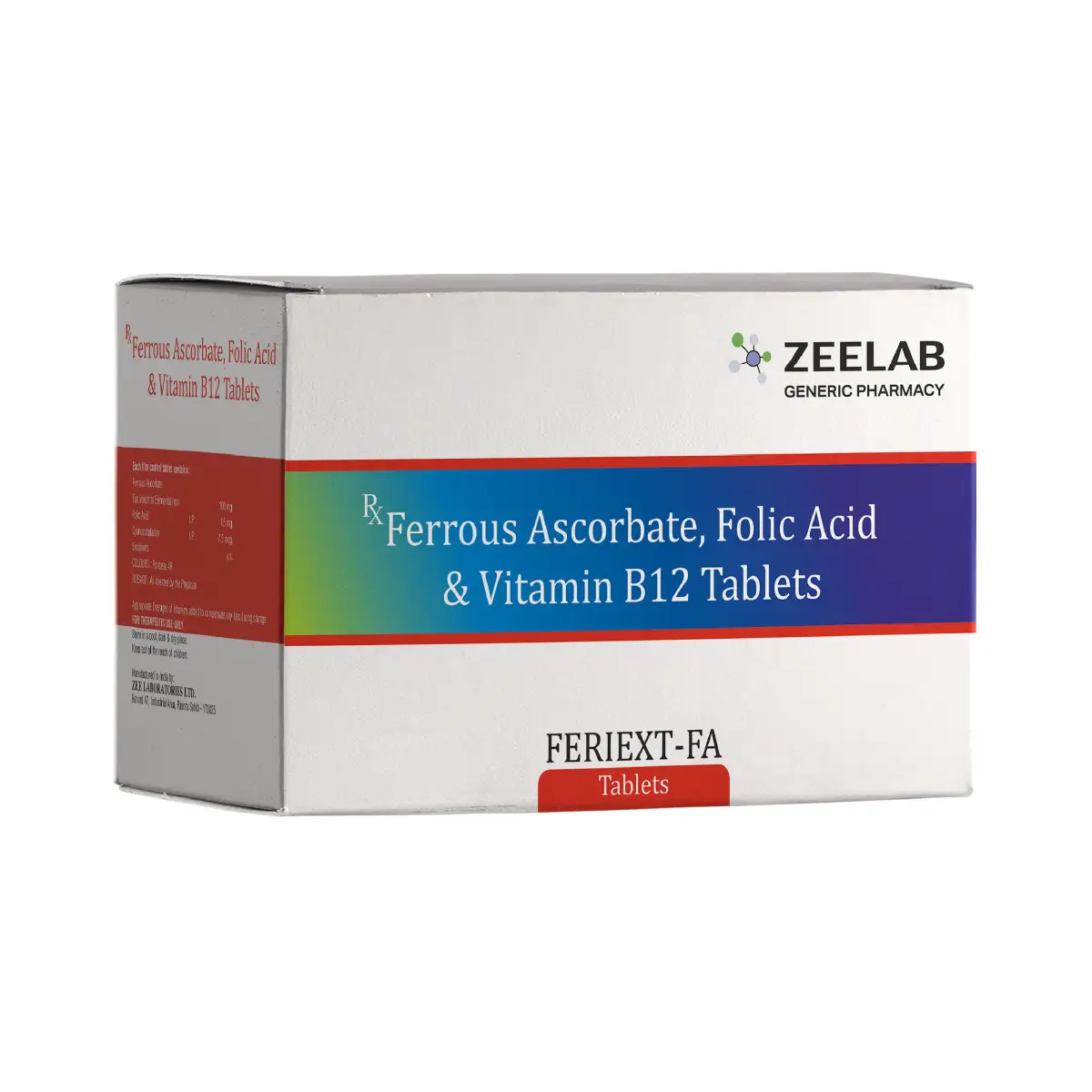

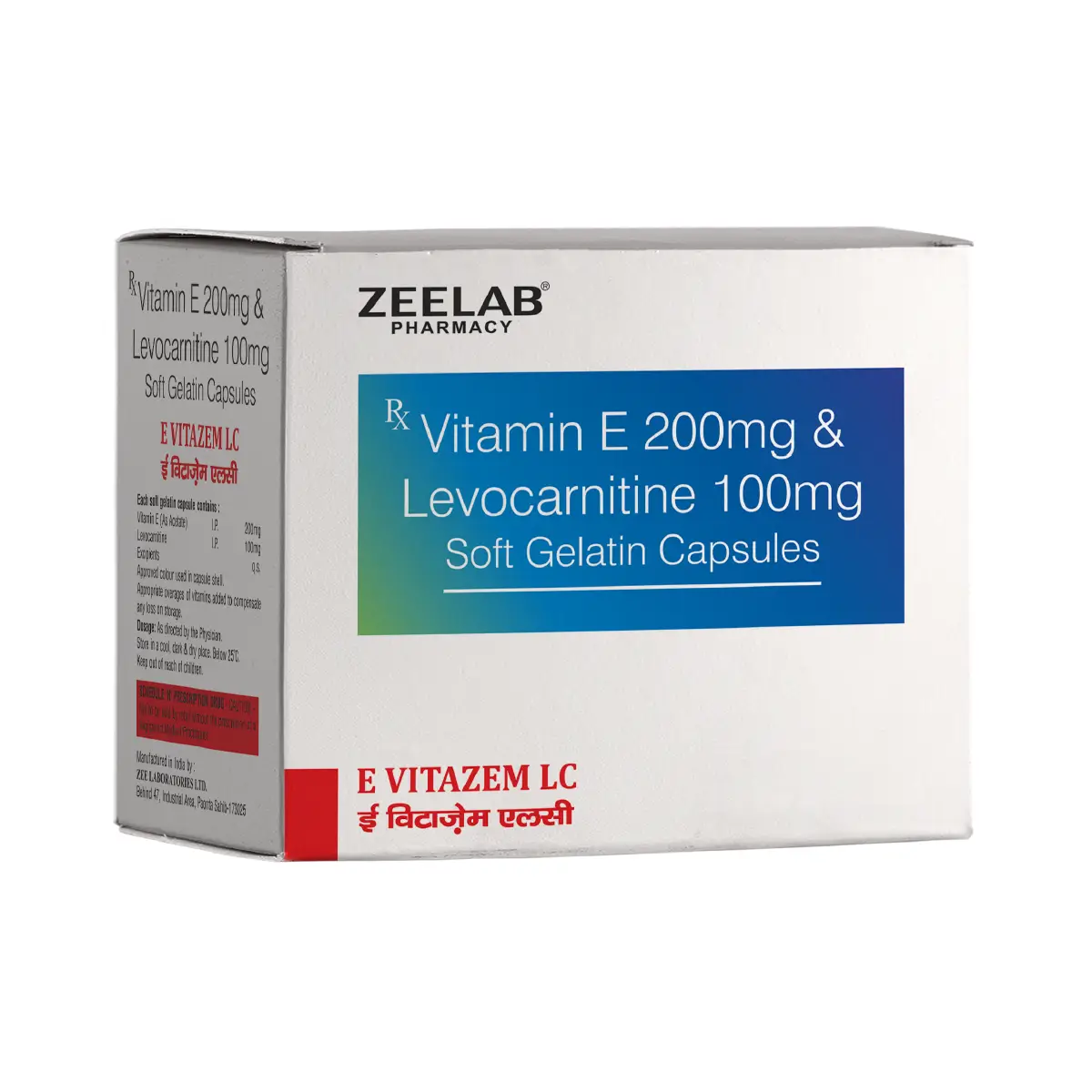

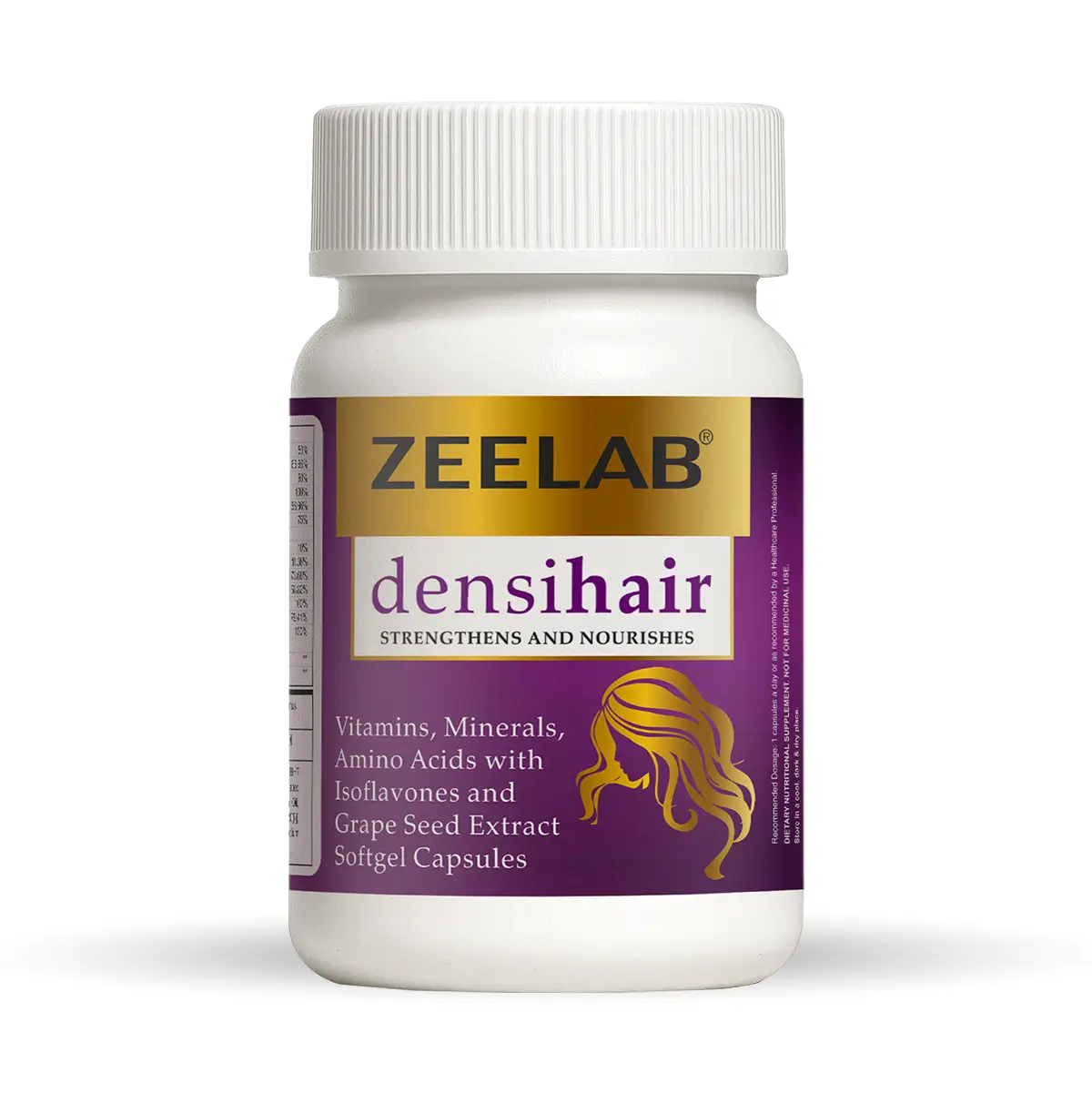
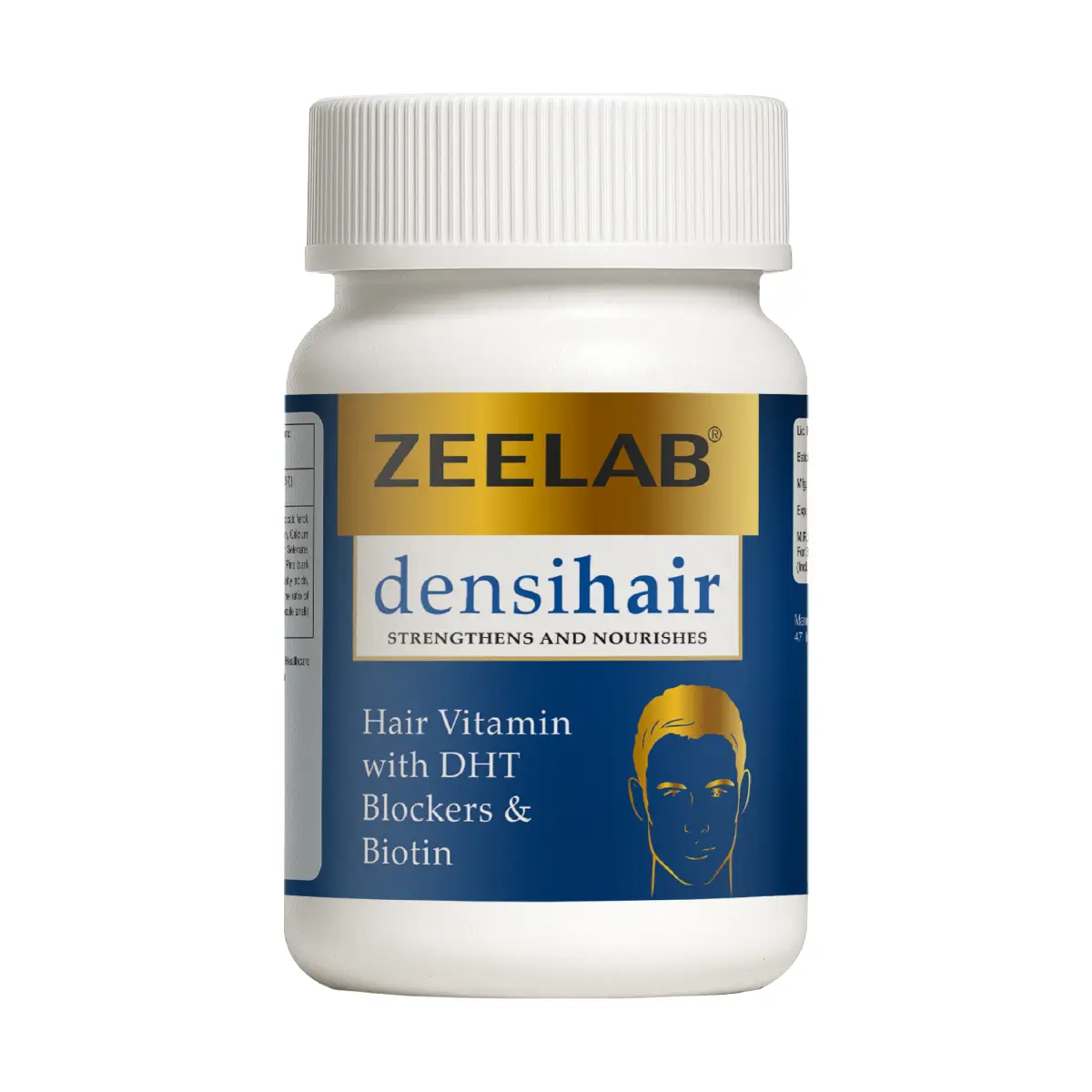















 Added!
Added!